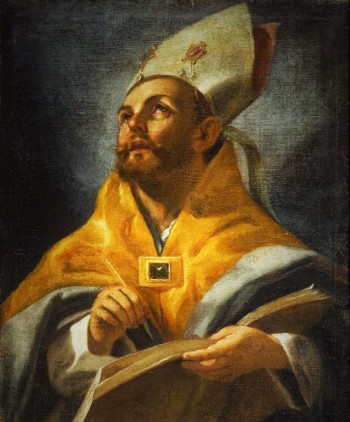
30 July
St Peter Chrysologus (400-450)
Bishop and Doctor of the Church
Born: 400 Imola, Province of Bologna, Emilia-Romagna, North-Central Italy
Died: 31 July 450 Imola, Province of Bologna, Emilia-Romagna region, North-Central Italy
Venerated in: Roman Catholic Church, Eastern Orthodox Church
Canonized: Pre-Congregation
St. Peter Chrysologus, “the man of golden speech”, earned the title of Doctor of the Church for his eloquent sermons, of which some two hundred remain. Made Archbishop of Ravenna by miraculous intervention of St. Peter in 433, he rooted out all remaining traces of paganism, as well as a number of abuses among the Christians. In his sermons he strongly urged frequent Communion. He is supposed to have given us the saying:
“He who wants to laugh with the devil cannot rejoice with Christ.”
St. Peter died about the year 450 in his native city of Imola.
COLLECT PRAYER
O God, who made the Bishop Saint Peter Chrysologus an outstanding preacher of your incarnate Word, grant, through his intercession, that we may constantly ponder in our hearts the mysteries of your salvation and faithfully express them in what we do. Through our Lord Jesus Christ, your Son, who lives and reigns with you in the unity of the Holy Spirit, God, for ever and ever.
Things to Do:
- Liturgical living necessarily includes a loving willingness to read and to listen to homilies and sermons. In this the contemporaries of St. Peter Chrysologus set us a good example; while the saint himself remains an inspiration and a guide for the proper approach to God’s holy word. How do you act and react toward God’s word as proclaimed in and outside of the liturgy?
- Read more about St. Peter Chrysologus here
- Read St. Peter Chrysologus, the Doctor of Short Homilies
- Visit Sermons of St. Peter Chrysologus
St. Peter Chrysologus
In the fifth century, Ravenna, not Rome, was the capital of the Roman Empire in the West, and Ravenna itself became a metropolitan see. St. Peter Chrysologus was one of the most distinguished archbishops of that see.
Peter was born in Imola about the year 400 and studied under Cornelius, bishop of that city, who ordained him deacon. In 433, the archbishop of Ravenna died, and when a successor had been chosen by the clergy and people of Ravenna, they asked Bishop Cornelius to obtain confirmation of their choice from Pope Sixtus III. On his trip to Rome, Cornelius took his deacon, Peter, as his companion; upon seeing Peter, the pope chose him for the see of Ravenna instead of the one selected by the clergy and people of Ravenna.
Peter was consecrated and was accepted somewhat grudgingly at first by both the clergy and the people. Peter, however, soon became the favorite of Emperor Valentinian III, who resided at Ravenna and was also highly regarded by Pope St. Leo the Great, the successor of Pope Sixtus.
There were still traces of paganism in Peter’s diocese, and his first effort was to establish the Catholic faith everywhere, rooting out abuses and carrying on a campaign of preaching and special care of the poor. Many of his sermons still survive, and it is on the basis of these that he came to be known as “the golden word.”
In his concern for the unity of the Church, Peter Chrysologus opposed the teaching of Eutyches, condemned in the East, who asked for his support. Peter also received St. Germanus of Auxerre to his diocese and officiated at his funeral.
Knowing that his own death was near, Peter returned to his own city of Imola and after urging great care in the choice of his successor he died at Imola about the year 450 and was buried in the church of St. Cassian. In 1729, Pope Benedict XIII declared him a Doctor of the Church. — The One Year Book of Saints by Rev. Clifford Stevens
Familiar is his dictum: “If you jest with the devil, you cannot rejoice with Christ.” Some of his sermons are read in the Breviary. Ravenna, his episcopal city, still harbors treasures of ancient Christian liturgical art dating to his day.
Source: Catholic Culture